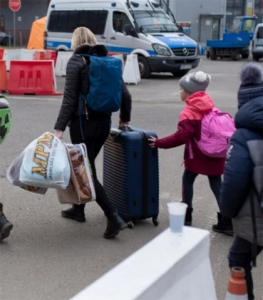Ukrainians arrive in Australia as part of huge exodus
Around 1100 Ukrainians have arrived in Australia since Russia invaded the country on February 24, according to Australian Prime Minister Scott Morrison.
Most arrived on tourist visas but will be offered three-year temporary protection visas and access to work, study and Medicare services.
 Mr Morrison said the Ukrainians would be offered three year visas and the opportunity to apply for permanent visas.
Mr Morrison said the Ukrainians would be offered three year visas and the opportunity to apply for permanent visas.
“Ukrainians are arriving in Australia and they are very welcome,” Mr Morrison said.
“But we expect that when the situation in Ukraine allows most of these people will want to return home,’ he said.
Meanwhile, the United Nations High Commissioner for Refugees (UNHCR), Filippo Grandi has said the current outflows of people from Ukraine represent “the fastest growing refugee crisis in Europe since World War II”.
The UNHCR expects up to four million people to move from Ukraine to neighbouring countries as the fighting continues.
And the European Commission for Crisis Management says the number could go as high as seven million.
In total, including internally the displaced, more than ten million people have been displaced by Russia’s invasion of it neighbour.
According to UN estimates, as of 22 March Poland has taken in 2.14 million refugees from Ukraine, followed by Romania (555,021), Moldova (371,104), Hungary (324,397), Russia (271,254) and Slovakia (256,838).
Officials in Central European countries have warned they are nearing their capacity to cope with the number of refugees. The World Health Organisation (WHO) has estimated 500,000 Ukrainian refugees in Poland are in need of support for mental health issues.
So far around 550 civilians have been killed in the conflict as well as between 2,000 and 4,000 Ukrainian troops and between 6,000 and 15,000 Russian troops.
Poland received a million refugees in just the first 11 days of the conflict with more people arriving daily.
The impact on the country’s state resources and capacity has been mitigated by 500 million Euros (USD551 million) in EU humanitarian aid funding.
But the large inflow of people causing long waiting times at the Polish-Ukrainian border, up to 72 hours.
Slovakia is also struggling to house a large influx of people, with the authorities prepared initially only for around 30,000 arrivals. The number of arrivals has already largely surpassed the expected capacity, with logistical organisation, transport, and
Romania and Moldova are responding to tens of thousands of arrivals mainly through building capacity quickly to host them for a prolonged period.
However, they are likely to struggle in this despite ongoing initiatives by civil society groups and non-profit organisations, as well as the distribution of EU funds to offset costs on the government.
Flows of refugees crossing national borders, by car, bus, and on foot, and priority given to passenger traffic at most border crossings is causing delays to ground cargo movement.
According to media reports and anecdotal evidence, the delays are up to 72 hours on the Polish-Ukrainian border and 35 hours on the Slovakian-Ukrainian border.
Movement of migrants from Moldova into Romania and from Romania into Bulgaria is also likely to cause traffic delays of between several hours and a few days, the reports say.
Adding to the trauma being suffering of Ukrainian refugees are reports of organised criminals, including sex trafficking gangs, attempting to prey on vulnerable people in transit.












